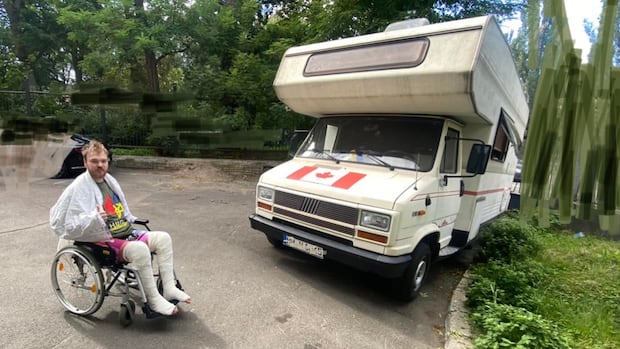Mac Hughes remembers the smell of diesel and the searing pain racing through his legs as he lay pinned underneath a burning vehicle after a drone strike in Ukraine’s Zaporizhzhia region on Canada Day.
The Calgarian, who signed a contract with the Ukrainian military a year and a half ago, was conscious as he was pulled out from underneath the vehicle with what turned out to be third-degree burns.
Now, after spending nearly two months lying in a hospital bed, the 23-year-old is trying to push through exhaustion as he takes his first steps as part of a rehabilitation program in the capital, Kyiv.
“It is tiring. It’s a big, long process,” he said. “It’s good to be back on my feet after 53 days.”
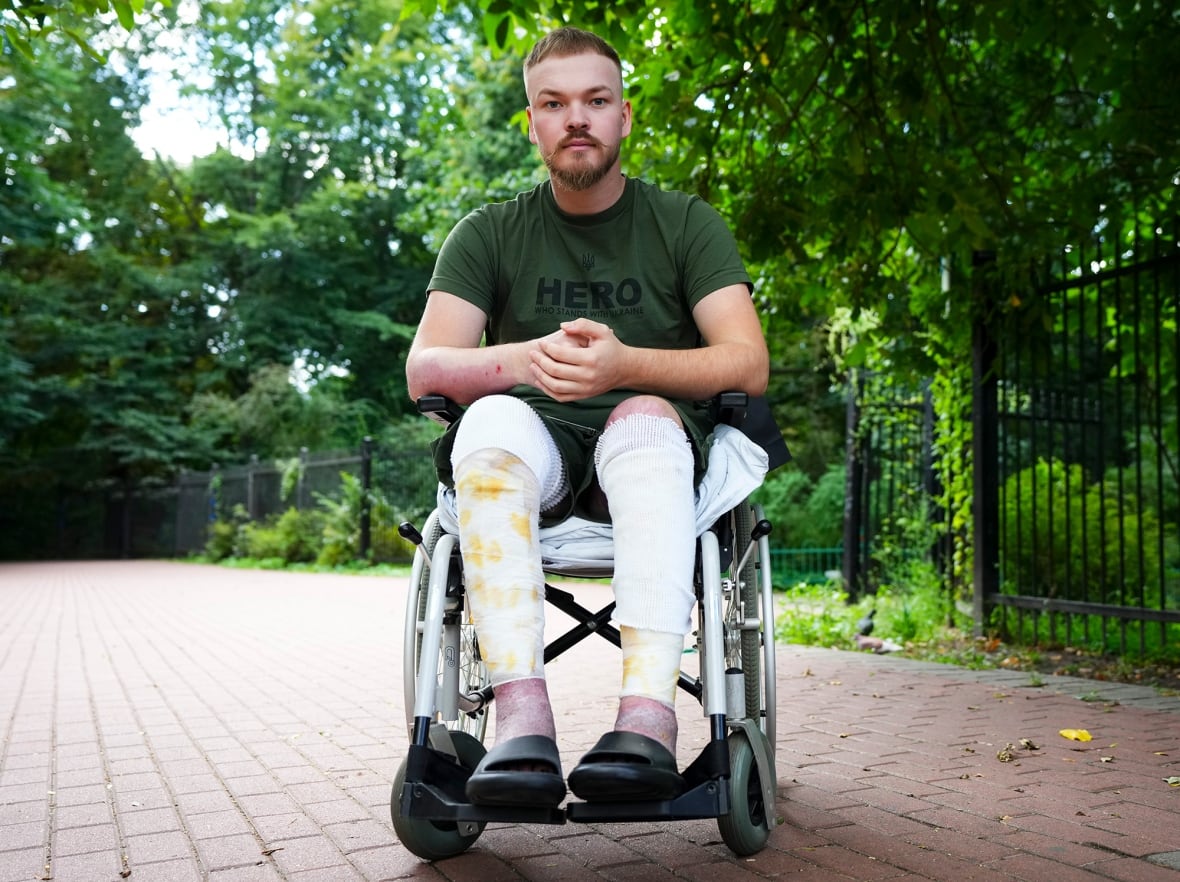 Canadian Mac Hughes, who was injured by a Russian drone attack while fighting for Ukraine on Canada Day, is pictured in Kyiv, Ukraine, on Aug. 25. (Sean Kilpatrick/The Canadian Press)
Canadian Mac Hughes, who was injured by a Russian drone attack while fighting for Ukraine on Canada Day, is pictured in Kyiv, Ukraine, on Aug. 25. (Sean Kilpatrick/The Canadian Press)
Hughes, who originally came to Ukraine in 2022 to join his father in carrying out humanitarian work with the non-governmental organization H.U.G.S. (Helping Ukraine Grassroots Support), decided to join the military after losing a friend who was also a soldier for Ukraine.
Now he’s recovering after being wounded by one of the biggest threats on both the battlefield and in Ukrainian cities: a Russian drone.
Hughes spoke to CBC News from a wheelchair after spending several minutes on crutches, where he had to brace himself with each tenuous step.
Coming in and out of the rehabilitation facility were other young men, including many who had lost limbs and were learning to adapt to prosthetics.
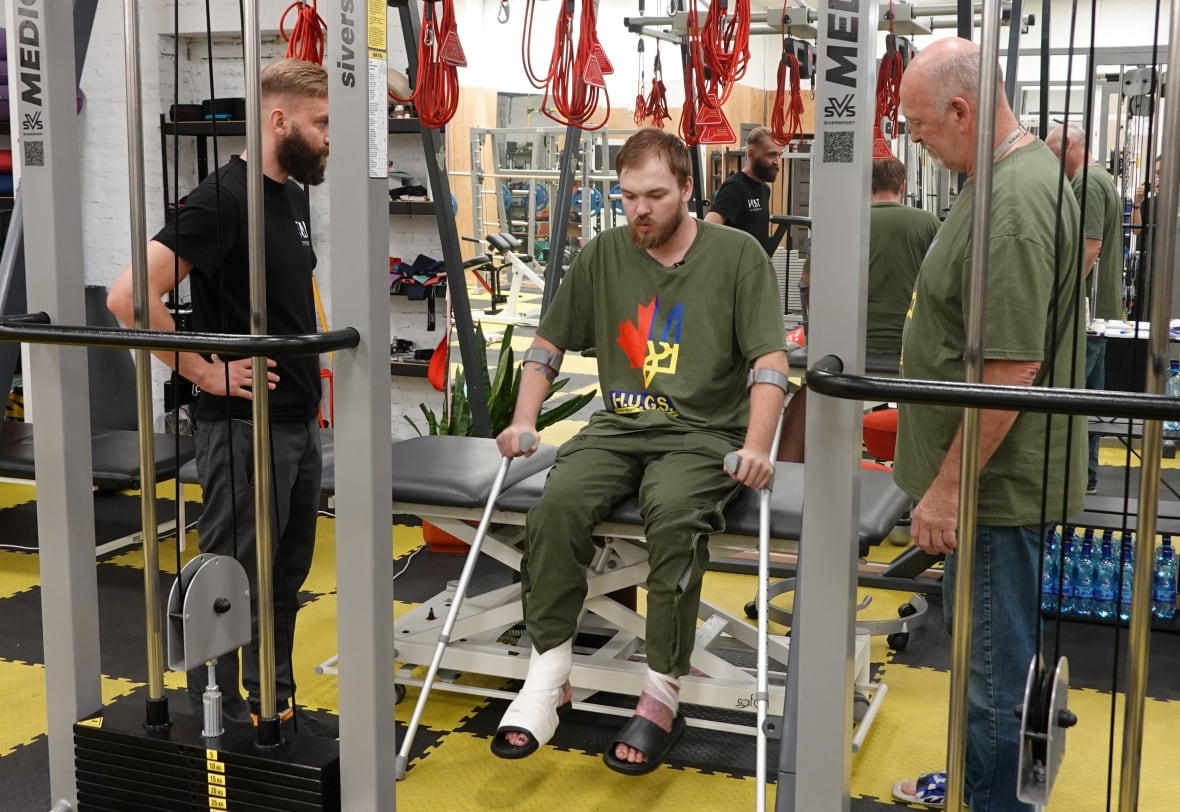 Mac Hughes initially came to Ukraine with his father, Paul, right, to work as a humanitarian volunteer. He later decided to join the country’s military. (Angela Johnston/CBC)
Mac Hughes initially came to Ukraine with his father, Paul, right, to work as a humanitarian volunteer. He later decided to join the country’s military. (Angela Johnston/CBC)
“For some of these guys, their lives are forever changed,” he said. “I was really, really lucky.”
An overnight phone call
When Paul Hughes spoke to his son on June 30, Mac told him he was disappointed he wouldn’t be able to attend the Canada Day gathering Paul was organizing in the northeastern city of Kharkiv, which is where the father-son duo had based their operations before Mac joined the military.
When an unknown number called Paul’s phone at 4:20 a.m. on July 2, he said he immediately felt like he had been punched in the gut.
“I’ll never forget that. I knew…. when I looked at the phone,” Paul said.
He raced to pick up Mac’s girlfriend, Lisa Rudchenko, and they sped down to Zaporizhzhia not really knowing what condition his son was in until they walked into the hospital room and saw him covered in bandages.
“It was too much to see my child that way,” Paul said. “He was a mess. They hadn’t really cleaned him up properly, and it was just quite horrific.”
When Hughes saw his dad walk into his hospital room, he recalled it was the very first time he had ever seen him cry.
Father-and-son duoSince that day, Paul hasn’t left his son’s side, as he was first transferred to a hospital in Kyiv and then on to Lviv, where he underwent skin graft surgery, which required using strips of skin from both of his upper thighs. 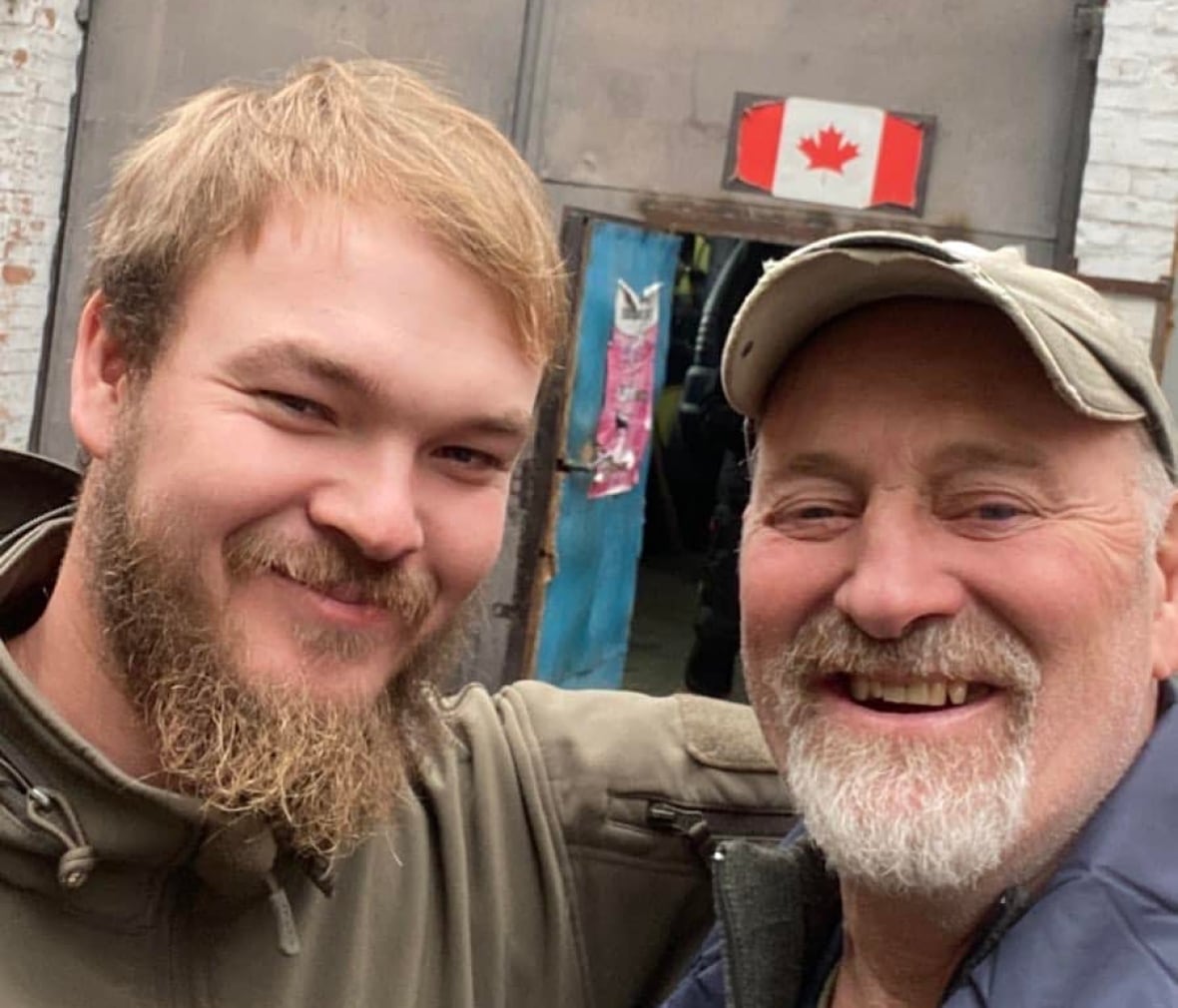 Paul and Mac Hughes are pictured in Kharkiv in 2024. (Submitted by Paul Hughes)
Paul and Mac Hughes are pictured in Kharkiv in 2024. (Submitted by Paul Hughes)
For most of that time, Paul has been living in a donated RV, which is easily recognizable in hospital parking lots because of the Canadian flag taped to the hood.
Paul, a veteran of the Canadian military, initially travelled to Ukraine in 2022 to take up arms against Russia but decided to pivot after seeing the humanitarian need.
Along with his son, he carried out humanitarian missions, including risky civilian evacuations, which at one point meant being interrogated by Russian soldiers at gunpoint when he entered occupied territory.
When Mac told him he wanted to do more to help Ukraine and join its military, Paul admits he was conflicted. Their humanitarian work was dangerous, but serving during an active war along a sprawling front line is on another level.
At least 11 Canadians have been killed in the region since Russia’s full-scale invasion in 2022, according to Global Affairs.
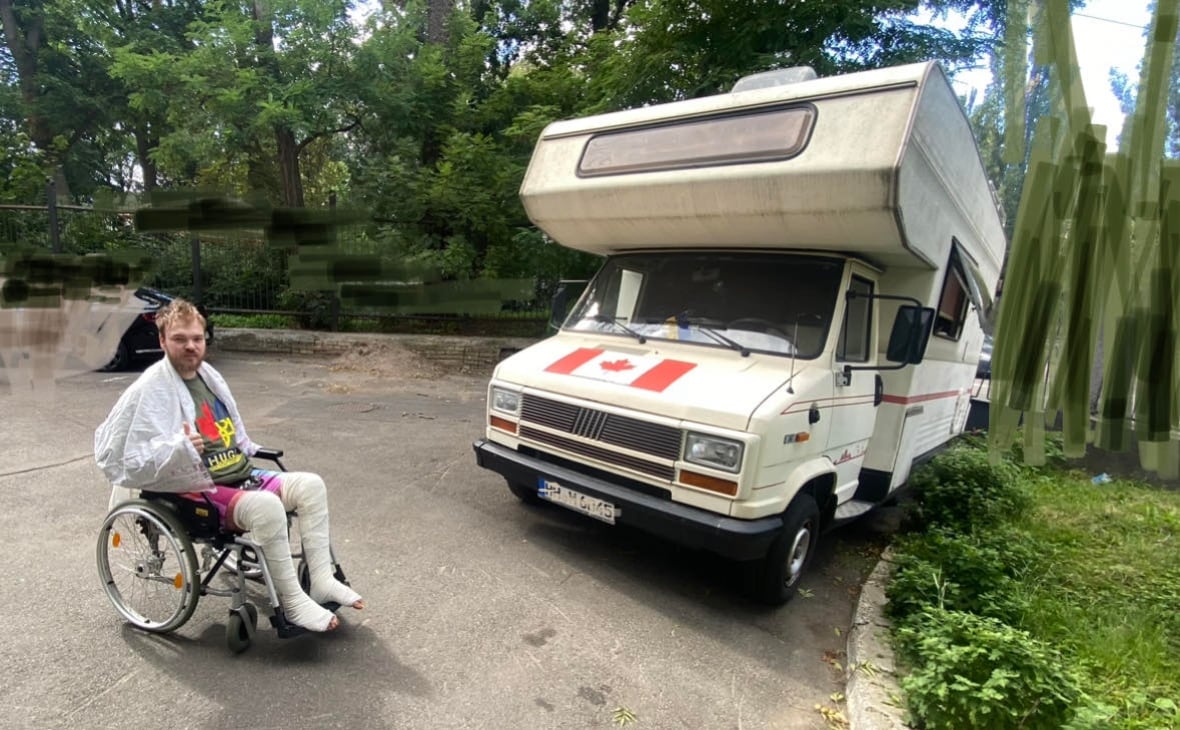 Mac Hughes sits outside of the hospital in Kyiv, next to the donated RV that his father has been living in as Hughes recovers in the hospital. (Submitted by Paul Hughes )Suffering flashbacks
Mac Hughes sits outside of the hospital in Kyiv, next to the donated RV that his father has been living in as Hughes recovers in the hospital. (Submitted by Paul Hughes )Suffering flashbacks
Mac Hughes wouldn’t disclose the specific nature of his work with the military, but said it was related to a variety of tasks, including driving.
He said the drone that caused the explosion was a Shahed, the self-destructing type of drone that Russia has launched in waves at Ukrainian cities.
“It was probably one of the scariest sounds I’ve ever heard in my life,” Hughes said.
WATCH | Mac Hughes is in recovery after being hit in a Russian strike in Ukraine: 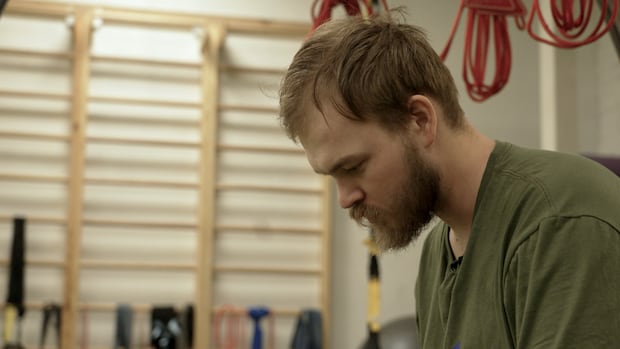
Canadian fighting for Ukraine recovering after being wounded
A Calgary man who was serving with the Ukrainian military was severely injured by a swarm of Russian drones on the frontline on Canada Day. He is now recovering from third-degree burns in a Kyiv hospital.
When the drones targeted Kyiv in record numbers throughout July, the ominous buzz kept Hughes awake in his hospital bed, experiencing flashbacks.
Hughes remains in hospital, where he receives mental health support along with physical therapy.
Over the weekend, a fundraiser was held at a bar in Kyiv to help raise money to cover the Hughes family’s expenses. Mac estimates it could be a few months before he is back to walking on his burned, scarred legs, which remain covered with bandages.
Sentimental tattoo
On his right arm, he points to a less serious burn and a treasured tattoo that depicts a maple leaf merged with the Ukrainian trident, over the blue and yellow colours of the country’s flag.
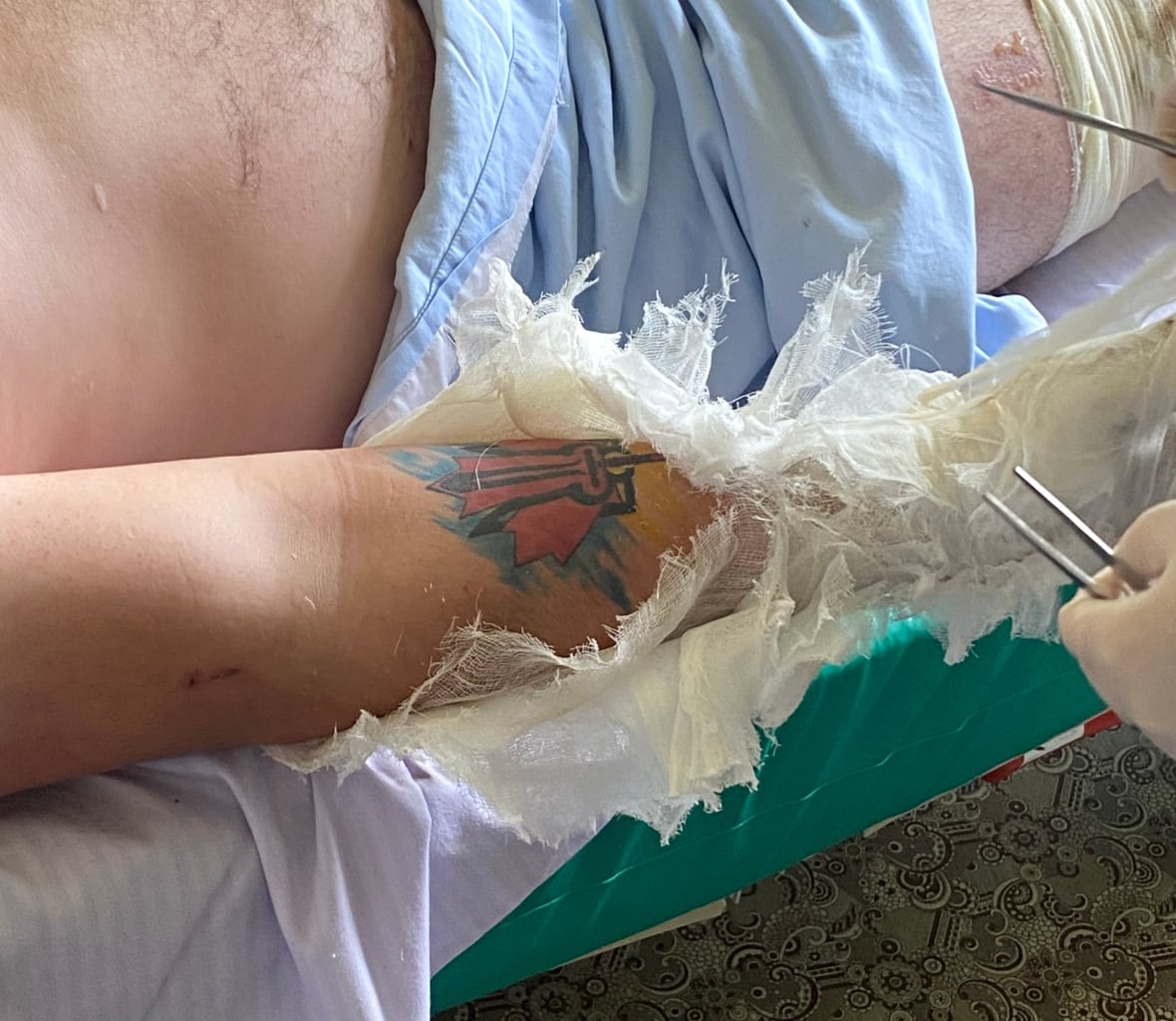 A photo of the tattoo on Mac Hughes’s right arm taken at a hospital in Zaporizhzhia on July 2, after he survived a drone attack a day earlier. (Submitted by Lisa Rudchenko)
A photo of the tattoo on Mac Hughes’s right arm taken at a hospital in Zaporizhzhia on July 2, after he survived a drone attack a day earlier. (Submitted by Lisa Rudchenko)
He got it a month after arriving in Ukraine. He had only planned to stay one month more; it’s now been three and a half years.
“So I kind of just fell in love with the country,” he said. “The places that we were going, the villages we were seeing, the people we were helping.”
That’s why he felt relieved when a day following the drone strike, he saw that the tattoo remained completely intact.
“They took the bandage off, and the first thing I said is, ‘Ukraine always survives.'”
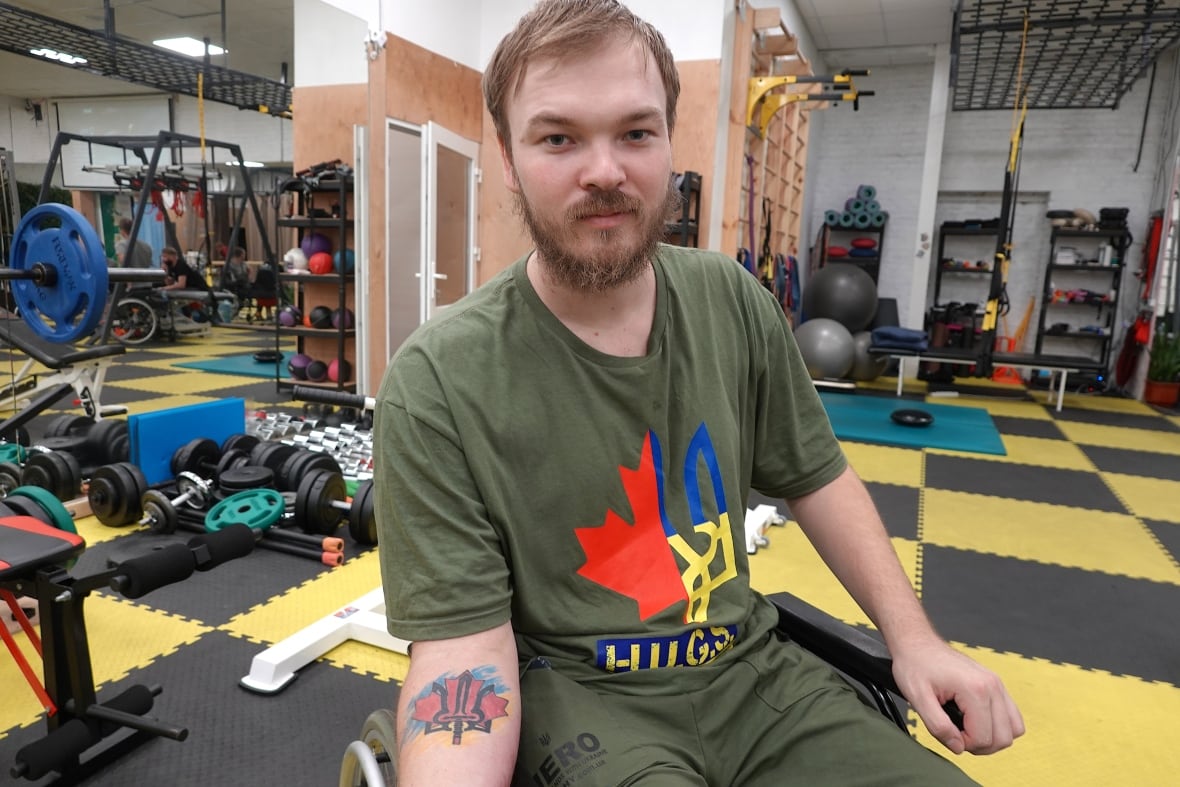 Mac Hughes was relieved when a doctor in Kyiv removed his bandage and he saw that the tattoo he got after arriving in Ukraine had not been burned in the drone attack. (Angela Johnston/CBC)
Mac Hughes was relieved when a doctor in Kyiv removed his bandage and he saw that the tattoo he got after arriving in Ukraine had not been burned in the drone attack. (Angela Johnston/CBC)
